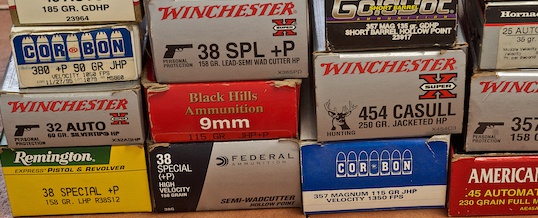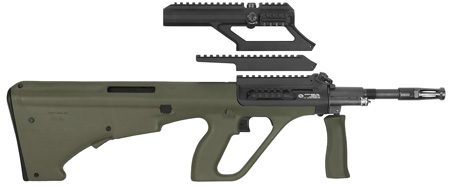
Self defense ammunition selection: how important is accuracy?
An interesting question came into my mailbox recently: why don’t I ever list accuracy as a criteria for picking ammunition for self defense or for concealed carry?
It’s a valid question. After all, when you see a defensive ammunition test (either in a magazine or online), one of the prominent features is almost always an accuracy comparison — how accurate it is compared to competing brands, how accurate it is out of various guns, and occasionally how accurate it is at various distances. It must be important, or people wouldn’t bother putting in their reviews. Right?
Well, maybe not. Let’s consider this from a larger perspective.
I’ve often counseled people not to over-think their choice of defensive ammunition. My ammunition selection criteria is pretty simple: I pick a modern hollowpoint bullet from a major manufacturer (such as the Speer Gold Dot, Federal HST, Winchester PDX-1, or Hornady Critical Defense) in the middle of the weight range for the caliber. I test it and make sure it functions perfectly in my gun, and then I find a practice load which duplicates (as closely as possible) the recoil characteristics and impact point of the chosen hollowpoint. Then I train, practice and carry with those loads. It’s really not all that complicated, though people sure try to make it so!
Following this procedure will put anyone far ahead of the pack in terms of their preparedness to deal with a criminal attack, because it’s the execution of skill which determines the outcome of the incident — not the ammunition used.
Still, people want to buy the “best” ammunition they can; it makes them feel better. Part of what’s “best” is the accuracy of the round, which is why I got the question in the first place. So why do I ignore it?
Primarily because it’s really not all that important! (I’m not saying hitting your target accurately isn’t important; only that the differences in ammunition accuracy aren’t great enough to be important.)
I’ve yet to see any specific ammunition that wasn’t more than adequately accurate for the job of self defense; in fact, it’s hard to find truly un-accurate ammunition! Any round you pick is going to be well beyond most people’s ability to discern a difference, and any difference that does exist is going to be minor in the scheme of things.
For instance, I once read an article testing the Remington Golden Saber 9mm against the Speer Gold Dot. Now I’ll admit to not being a fan of Remington ammunition in general (I’ve not had good luck with their reliability), but the test harped on how badly the Golden Saber did in their accuracy testing. They shot the ammo out of the same handheld gun (a Glock 17, if memory serves) and found that the Remington rounds had something like a 2.75” group at 25 yards, where the Speer round was about 2.35” at the same distance.
I’m not sure that the accuracy difference was as large as claimed, and I’m definitely not sure it matters!
To be sure of any difference in accuracy you’d first have to establish that you have enough data from enough rounds. This means that you’d need to shoot it from a solid mechanical rest (like a Ransom Rest) under controlled conditions from the same gun. Handholding won’t work, and you’d probably need to keep the shooter in the dark as to which ammunition was in the gun so that he/she couldn’t influence the results.
(Remember how I told you I don’t like Remington ammunition? That opinion would no doubt affect how I shot that ammunition unless I didn’t know that’s what I was shooting, and yes the operator *can* affect the accuracy obtained from a Ransom Rest.)
Second, you’d need to do it many times to get sufficient data points. A single group out of any given gun isn’t necessarily indicative of anything, but as you shoot more groups and the data pool gets larger you can start to trust the results.
Third, you’d need to that all over again with a different gun, and then with another gun, and another, until you had many hundreds of groups from many guns to compare. Then you *might* be able to say that there was an actual gap in accuracy potential.
Finally, you’d have to establish that any accuracy variance really had an impact on the defensive value of the rounds. If we were talking about, say, a 1” group at 25 yards compared to a 5” group at the same distance, one could make the case that the more accurate rounds were certainly desirable. Now consider he very real possibility that any deviation will actually end up being measured in fractions of an inch, and all of the sudden it’s not so much of a concern.
When all is said and done, any ammunition from any of the major manufacturers is simply going to be more than accurate enough for even the most critical defensive situations. Instead of worrying about perceived accuracy issues, I think it’s better to work on your ability to deliver accurate hits on target to whatever level of precision the target dictates. I haven’t seen any ammunition yet which actually hindered my students’ ability to do that!
As I said: a modern hollowpoint from a major manufacturer in about the middle of the weight range for the caliber — then practice. That’s a better recipe for success than obsessing over fractions of an inch.
What’s your choice in defensive carry ammunition, and why?
– Grant Cunningham
- Posted by Grant Cunningham
- On September 22, 2015



